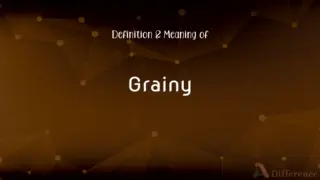Iwi vs. Hapu — What's the Difference?
By Urooj Arif & Fiza Rafique — Updated on May 2, 2024
Iwi refers to larger tribal groups in Māori society, focusing on broad kinship, while hapū represents sub-tribes, emphasizing closer familial ties.

Difference Between Iwi and Hapu
Table of Contents
ADVERTISEMENT
Key Differences
Iwi, in Māori culture, denotes a large tribal group that forms the principal unit of traditional social organization, encompassing broad kinship connections across regions. Whereas, hapū refers to a sub-tribe, smaller than an iwi, consisting of extended families who share a more immediate common ancestry.
Iwi are significant in defining one’s identity in the Māori world, often linked with vast geographical territories and multiple hapū. On the other hand, hapū operate on a more localized level, often responsible for local governance and daily social interactions within their communities.
The leadership within an iwi is typically managed by chiefs or a tribal council, which includes representatives from various hapū, highlighting a hierarchy of governance. Conversely, hapū leadership is more intimately connected with the immediate community, focusing on the direct needs and well-being of its members.
Membership in an iwi is generally inherited through birth and whakapapa (genealogy), signifying a broader cultural and historical legacy. In contrast, hapū membership emphasizes active participation and closer familial bonds within the sub-tribe, underscoring their role in nurturing and maintaining Māori traditions on a familial level.
Comparison Chart
Definition
A large tribal group in Māori society.
A sub-tribe or extended family within an iwi.
ADVERTISEMENT
Size and Scope
Larger, encompassing broad kinship connections.
Smaller, focused on immediate family ties.
Role in Society
Broad social organization, identity formation.
Local governance, daily social interactions.
Leadership
Managed by chiefs or a tribal council.
Led by local leaders with direct community ties.
Membership Basis
Inherited through birth and genealogy.
Emphasizes active participation and closeness.
Compare with Definitions
Iwi
Represents broad ancestral connections and regional territories.
Iwi are often associated with specific landscapes and water bodies.
Hapu
Acts as the immediate family community in Māori society.
Hapū gatherings are common for discussing community matters.
Iwi
A major tribal group in Māori culture, typically comprising several hapū.
The Ngāpuhi is one of the largest iwi in New Zealand.
Hapu
A sub-tribe in Māori culture, more closely knit than iwi.
The hapū functions as the backbone of the community.
Iwi
A fundamental unit of traditional Māori social organization.
Each iwi has its own governing body and marae (tribal meeting grounds).
Hapu
Responsible for managing local resources and marae.
Hapū meetings are crucial for decision-making at the local level.
Iwi
Plays a significant role in national Māori politics.
Iwi representatives often partake in national discussions on treaty settlements.
Hapu
Smaller than iwi, focused on direct familial lineage.
Members of a hapū usually share a direct ancestor.
Iwi
Central to Māori identity and cultural heritage.
Tribal affiliations to iwi are highlighted during formal introductions.
Hapu
Integral to maintaining Māori language and customs locally.
Hapū initiatives often focus on language revitalization.
Iwi
Iwi (Māori pronunciation: [ˈiwi]) are the largest social units in Aotearoa (New Zealand) Māori society. The Māori-language word iwi roughly translates to "people" or "nation", and is often translated as "tribe", or "a confederation of tribes".
Hapu
(NZ) A subtribe of an iwi or Maori tribe; the basic political unit within Māori society; a subtribe or extended family.
Iwi
(NZ) A Maori tribe.
Common Curiosities
What roles do iwi play in Māori society?
Iwi play crucial roles in identity formation, social organization, and participation in national politics.
Can a person belong to more than one hapū?
Yes, individuals can belong to multiple hapū, especially through different familial lines.
What is the importance of hapū in Māori culture?
Hapū are essential for local governance, maintaining traditions, and fostering community well-being on a familial level.
Why is iwi identity important in New Zealand?
Iwi identity helps preserve Māori heritage, facilitates cultural continuity, and influences legal and political matters related to the Treaty of Waitangi.
What is an iwi in Māori culture?
An iwi is a large tribal group that forms a fundamental unit of social organization in Māori society.
How is hapū different from iwi?
Hapū are sub-tribes or extended families within an iwi, smaller and with closer familial ties.
How does hapū leadership work?
Hapū leadership is often more localized and directly connected to the community, managing daily interactions and resources.
How do iwi and hapū collaborate in cultural preservation?
Both iwi and hapū work together to uphold Māori traditions, language, and customs, each playing unique but interconnected roles in cultural preservation.
How does one become a member of an iwi?
Membership in an iwi is generally inherited through birthright and genealogical connections.
What is the relationship between iwi and hapū?
Hapū are constituent parts of iwi, functioning as sub-tribes within the larger tribal structure.
Share Your Discovery

Previous Comparison
Certificate vs. Citation
Next Comparison
Mills vs. MillAuthor Spotlight
Written by
Urooj ArifUrooj is a skilled content writer at Ask Difference, known for her exceptional ability to simplify complex topics into engaging and informative content. With a passion for research and a flair for clear, concise writing, she consistently delivers articles that resonate with our diverse audience.
Co-written by
Fiza RafiqueFiza Rafique is a skilled content writer at AskDifference.com, where she meticulously refines and enhances written pieces. Drawing from her vast editorial expertise, Fiza ensures clarity, accuracy, and precision in every article. Passionate about language, she continually seeks to elevate the quality of content for readers worldwide.











































